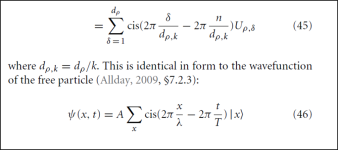Underseer
Contributor
YouTube personality AnticitizenX made this post on Facebook:
https://www.facebook.com/Anticitize...3748663777598/958306474321811/?type=3&theater
I hope I'm not violating any copyright stuff by posting this here for anyone who can't view anything at the above link:
First, a caveat: I had one, maybe two semesters of quantum, and that was decades ago. I barely made it through the class, and I haven't touched it since, so a lot of what AnticitizenX is saying above went over my aging and addled brain.
Still, I hope that something in this post will help others spot woo-woo when people try to hide it in quantum physics. Woo-peddlers just love to use quantum physics because as Feynman said, if you think you understand quantum physics, you don't understand quantum physics. They know most people's eyes will glaze over and not look too closely at any of the claims.
So I guess I'd like to talk about several things:
A lot of people try to use quantum physics to wriggle out of determinism when it comes to consciousness, free will, and the human brain. They will insist that some quantum effect has an influence over the resulting thoughts, therefore determinism doesn't apply to the mind, therefore free will.
The problem with this of course is that if some quantum effect influences our thoughts, then some aspect of our decisions has no cause. That is, our minds are just very elaborate slot machines that make decisions at random. While this allows for "free will" under the determinism definition of free will, if our decisions are random and uncaused, then that is not what any normal person would describe as free will regardless of whether or not determinism is involved.
As for spotting woo, normally when someone tries to link discussions about consciousness or free will to quantum physics, I demand a citation. Apparently, this person produced one, and I'm not sure I'm qualified to figure out what's wrong with this one (at least not without hand-holding such as AnticitizenX provided).
Anyhow, what're your thoughts on any of this?
https://www.facebook.com/Anticitize...3748663777598/958306474321811/?type=3&theater
I hope I'm not violating any copyright stuff by posting this here for anyone who can't view anything at the above link:
AnticitizenX said:Our favorite quantum idealist (Raatz) posted this, saying that it represents a derivation of the free particle from literal "consciousness." When you actually read the paper, however (Hoffman and Prakash, 2014), it's really nothing of the sort. The authors just kind of state it outright while providing no justification for where it really came from. But the real funny part for me was that (46) is simply nothing at all like the expression for a free particle. It's more of a bastardized gibberish expression that kinda-sorta looks quantum-ish, but doesn't really mean anything.
For example, what kind of idiot uses the spatial variable x as an index for the summation? That alone is a dead giveaway that the authors are completely clueless. Another problem is the use of bra-ket notation where it simply doesn't belong. The "|x>" term has no place in the free-particle expression, because the |x> is supposed to specifically represent an arbitrary state function. It's as if the authors is just copied random symbols from a QM book, but then stuck then together without any clue as to their meaning.
So not only does the author fail to actually "derive" anything, but the result he gives is simply not what he says it is. This is a perfect representation of the abject buffoonery that is the quantum idealist crowd. It's just fancy enough that it sounds impressive to non-technical people, but for those of us who are actually experts, it's immediately apparent how little these morons understand the subject.

First, a caveat: I had one, maybe two semesters of quantum, and that was decades ago. I barely made it through the class, and I haven't touched it since, so a lot of what AnticitizenX is saying above went over my aging and addled brain.
Still, I hope that something in this post will help others spot woo-woo when people try to hide it in quantum physics. Woo-peddlers just love to use quantum physics because as Feynman said, if you think you understand quantum physics, you don't understand quantum physics. They know most people's eyes will glaze over and not look too closely at any of the claims.
So I guess I'd like to talk about several things:
- How to tell when someone is using quantum physics to peddle nonsense.
- The relationship between quantum physics and consciousness and/or free will.
A lot of people try to use quantum physics to wriggle out of determinism when it comes to consciousness, free will, and the human brain. They will insist that some quantum effect has an influence over the resulting thoughts, therefore determinism doesn't apply to the mind, therefore free will.
The problem with this of course is that if some quantum effect influences our thoughts, then some aspect of our decisions has no cause. That is, our minds are just very elaborate slot machines that make decisions at random. While this allows for "free will" under the determinism definition of free will, if our decisions are random and uncaused, then that is not what any normal person would describe as free will regardless of whether or not determinism is involved.
As for spotting woo, normally when someone tries to link discussions about consciousness or free will to quantum physics, I demand a citation. Apparently, this person produced one, and I'm not sure I'm qualified to figure out what's wrong with this one (at least not without hand-holding such as AnticitizenX provided).
Anyhow, what're your thoughts on any of this?
